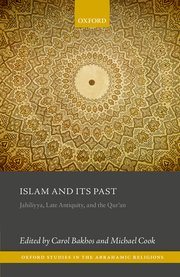Aziz Al-Azmeh at The Marginalia Review of Books:
 Current scholarship on Paleo-Islam was strongly marked by the publication in 1977 of Hagarism: The Making of the Islamic World by Crone and Michael Cook. This domain of history had then for decades attracted little consolidated academic energy, its themes generally considered plain and uncomplicated, corresponding to a grand narrative pervading classical Arabic sources. Hagarism proposed that Arabic historical sources should be disregarded, that other sources, including an Armenia chronicle, should be preferred, and that at its inception Islam was really a Jewish sectarian movement. The book’s cognitive harvest was scant, but its warning against uncritical reliance on classical Arabic sources, and its narrative revisionism, were carried forth by a sprightliness altogether uncommon in Islamic studies. Hagarism’s unfledged source-critical skepticism, and consequences drawn from it, came together to define the major commonplaces of what rapidly came to be regarded as the mainstream studies of Paleo-Islam since. A default setting of hyper-scepticism congealed rapidly into an academic orthodoxy that came to project an air of assurance, self-evidence and effortless repeatability. This setting was reinforced by relative institutional isolation of the field from the broader reaches of the historical sciences, by inbred, tribal habits of reading, and dedication to in-house issues and concerns.
Current scholarship on Paleo-Islam was strongly marked by the publication in 1977 of Hagarism: The Making of the Islamic World by Crone and Michael Cook. This domain of history had then for decades attracted little consolidated academic energy, its themes generally considered plain and uncomplicated, corresponding to a grand narrative pervading classical Arabic sources. Hagarism proposed that Arabic historical sources should be disregarded, that other sources, including an Armenia chronicle, should be preferred, and that at its inception Islam was really a Jewish sectarian movement. The book’s cognitive harvest was scant, but its warning against uncritical reliance on classical Arabic sources, and its narrative revisionism, were carried forth by a sprightliness altogether uncommon in Islamic studies. Hagarism’s unfledged source-critical skepticism, and consequences drawn from it, came together to define the major commonplaces of what rapidly came to be regarded as the mainstream studies of Paleo-Islam since. A default setting of hyper-scepticism congealed rapidly into an academic orthodoxy that came to project an air of assurance, self-evidence and effortless repeatability. This setting was reinforced by relative institutional isolation of the field from the broader reaches of the historical sciences, by inbred, tribal habits of reading, and dedication to in-house issues and concerns.
more here.
